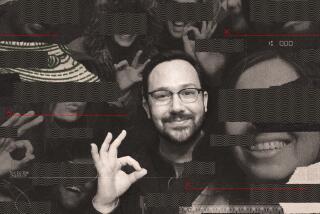A Good Scoop in Nigeria Fills Reporter’s Purse
- Share via
ABUJA, Nigeria — This is election season in Nigeria, when journalists who attend political events are presented with the usual handouts: biographies of candidates, perfunctory photographs and brown envelopes stuffed with wads of cash.
The money, candidates say, should be used to help with the reporters’ travel, expenses and to facilitate an all-around decent job. If reporters produce favorable articles, another brown envelope might follow.
In Nigeria, many journalists attend political -- and various -- events expecting to receive not necessarily scoops, but cash-filled brown envelopes. The practice has become so rampant in this West African nation that it is referred to as “the brown envelope problem.” Local and international observers monitoring ongoing elections warn that the practice is threatening to corrode Nigeria’s fledgling democracy because positive publicity is usually reserved for the highest givers.
“What we are seeing in Nigerian journalism today is a total collapse of morality,” Waziri Adio, a commentator for This Day daily newspaper, wrote in a recent commentary. “Nigerian journalism is not just a profession where anything goes, it is now one of the bastions of corruption in the country. It is a supreme irony that this is a profession that is supposed to unearth corruption.”
The practice is beginning to take its toll on the profession, said Edetaen Ojo, director of Media Rights Agenda, which lobbies for press freedom. “Many people are increasingly suspicious of what they’re reading or hearing in the media,” he said. “They feel that reporters are increasingly becoming hired guns.”
But journalists say accepting brown envelopes is simply about survival. Many journalists receive meager or no wages from their employers. Some earn as little as $25 a month.
Emeka Nze, a political writer with the People’s Agenda, a daily newspaper based in Lagos, recalled that when he was hired, his editors gave him his press credentials with the admonition to “go out there and make money for yourself.”
These days, Nze said a good political writer could earn about $200 a month by attending events and collecting brown envelopes.
“You do your job and please some people,” said Nze, who said he has had to survive on the contents of brown envelopes because he hasn’t been paid in six months. “The people who are pleased will appreciate you. But sometimes you do a good job and get nothing.”
Some reporters say they are required to share their bounty with editors, especially if they are assigned to lucrative beats, such as politics and the oil industry. Others say it is well known that top editors and publishers receive thicker “brown envelopes” in the form of cars, land and houses from government officials.
All major journalism groups here frown on the practice. The 6,000-strong Nigerian Union of Journalists implores its members not to accept brown envelopes because “it undermines professionalism and the dignity of the profession,” said Emmanuel Ogbeche, who heads the group’s press monitoring committee.
“The more you collect, the more you have to deliver,” he said.
Asked if he accepted brown envelopes regularly, Ogbeche said matter-of-factly: “Of course. It’s how a lot of us live.”
Indeed, many Nigerian newsmakers -- politicians, musicians and businessmen -- have come to accept that if they host a news event, they have to dole out brown envelopes, also known in Nigeria as “better life.”
“You are aware that these men and women have to take public transport to attend your event and at the end of the day they’re not getting paid,” said Lanre Ope, a state senator in Lagos. “It’s probably not ethical for them to take the gifts, but you’re just helping them out.”
Even Nigeria’s Information Minister Jerry Gana doesn’t seem immune to the practice. Last year, Gana sparked a controversy when he summoned foreign correspondents to Abuja, the capital, to protest a CNN report suggesting that Nigerians would welcome a return to military dictatorship despite living under the civilian rule of President Olusegun Obasanjo.
Obasanjo is favored to beat 19 challengers in Saturday’s presidential and gubernatorial elections.
After lecturing reporters about honest and accurate reporting, Gana’s underlings presented each with a media kit containing reference material on Nigeria and about $400 in cash.
Gana and other government officials later insisted that the money was meant to reimburse correspondents for their airfare and accommodation. Because the money was announced openly, it could not be considered a bribe, they said.
To be sure, some Nigerian reporters do not accept brown envelopes, saying they have a proud tradition to uphold. During military dictatorships, the same ill-paid journalists faced down military dictators who beat, jailed, and even executed reporters. Several Nigerian reporters had to flee the country to escape imprisonment and death. Others who stayed behind worked for banned newspapers that dodged government censors by printing their newspapers in different plants.
The press was liberated in 1999 when Obasanjo’s election ended 15 years of military rule. Now with more than two dozen daily national newspapers and scores of smaller publications, Nigeria boasts one of the most vibrant presses in all of Africa .
But it is yet to be liberated from the brown envelope problem.
It is not uncommon to see a several pages lauding the achievements of a governor or other political candidate. Such articles, which owe their existence to brown envelopes, are usually labeled “special feature” and carry the bylines of an unnamed “special correspondent.”
“For many politicians, giving brown envelopes to reporters is considered part and parcel of their overall practice of bribing the electorate to secure votes,” said Chris Ogbondah, a Nigerian-born journalism professor at the University of North Iowa. Ogbondah recently has counseled media programs in Nigeria to teach ethics to students and called on press groups to urge members not to accept financial favors for doing their jobs.
Nze, of the People’s Agenda, said he and his colleagues do not like relying on handouts from politicians and others.
“If you give us a choice, we would prefer good pay checks over brown envelopes,” he said.
More to Read
Sign up for Essential California
The most important California stories and recommendations in your inbox every morning.
You may occasionally receive promotional content from the Los Angeles Times.










